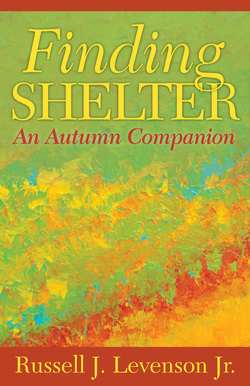Читать книгу Finding Shelter - Russell J. Levenson Jr. - Страница 8
На сайте Литреса книга снята с продажи.
ОглавлениеMeditation 1
A Change of View
And the Lord God made garments of skins for the man and for his wife, and clothed them.
—Genesis 3:21
I have a few kaleidoscopes that I keep near my desk. Sometimes, particularly when I have had a challenging conversation with someone where we might not have seen “eye to eye,” I pick one up, hold it up to the light, and give it a few turns. They are reminders to me that not everyone sees everything the same way—and in fact, sometimes the way I am seeing things needs a fresh perspective, a change of view.
The first book of scripture, Genesis, has much to offer. Its first phrase in Hebrew is bereshith, meaning “in the beginning.” The English title we use comes from the Greek geneseos, which could have a variety of meanings—birth, origin, even genealogy. In any case, for those of us in Judeo-Christian faiths it is the starting point. We almost immediately think of that opening chapter of our story—creation born, flora and fauna come to life, man and woman brought to life by the breath, the ruach, of God. A good day or two, and then, well—the devil shows up and everything goes quickly down the drain. Temptation, deception, betrayal, shame, and ultimately punishment as Adam and Eve are banished from Eden. Onward.
But there is a kind of throwaway line in the story that many people miss. After Adam and Eve carry out the first “cover up,” we are told, before they were tossed into the harsh cruel world, God sat down and made them garments to wear—He “clothed them,” the scriptures say.
Does that not say a lot about God? He really is a parent. God certainly has days when He is angry at what His children have done, but that does not mean God stops loving them, caring for them, providing for them. Here, “in the beginning” sin was born (original sin, we theologians call it); God could have wiped the blackboard clean and given it another start. But nope, He decided—even in the midst of the discipline about to be carried out—not to send His children into the world without the protection they needed.
When this line caught my eye some years ago, it was a kaleidoscope moment. I often focused on the sin and guilt and shame and punishment part; and passed right over the truth that even then—in fact right in the middle of it—there was God’s care. The psalmist would remind the reader, “O give thanks to the Lord, for he is good, for his steadfast love endures forever” (Psalm 136:1). We do not dismiss what went wrong in Eden, but what if we also had a change of view and considered what went right? God did not stop the story when things got off to a rocky start—it just became part of the story—a story He actually plays a part in by revealing the intention to watch over His children and care for them, even when they stray.
The reason I begin with this reflection is that I find in my work way too many people live in the past. They become weighed down with their guilt, sin, mistakes, bad decisions. When that becomes a part of who you are—grafted into your heart—then it can begin to define you. You have a myopic view that only sees the sin, and it’s easy to transfer that view onto how you believe God sees you.
But give the kaleidoscope a turn or two, and remember that God is always making life out of mud pies, if we would but let Him. My hunch is the clothes God fashioned for Adam and Eve fit just right—perhaps God even took a step back after donning His firstborn creatures, with needle clenched between divine teeth, a smile and a pat and a “There . . . there . . . that ought to do it.” Why would He do such a thing? It was God’s way of saying, “Let us get on with life—exhale the past, inhale the future.” A change of view, indeed.
A New Leaf
Do you need to turn over a new leaf when it comes to understanding God? None of us is perfect, and certainly when we sin, confession is good for the soul; but do we live in the past, or can we turn the past over and live into the present and future? When we hand over our dark places to God, He not only tosses them away (“as far as the east is from the west, so far he removes our transgressions from us,” the psalmist writes), but He also will “cleanse us from all unrighteousness” as the Apostle John would write—as if the past never happened at all. In other words, God forgives the repentant sinner and He does not hold it against you—perhaps you should do the same to the one in the mirror. Perhaps you need a change of view.3
A Prayer
Lord, help me this day to give You the dark places in my heart and soul. As I do, give me the faith to hold fast to Your grace and mercy, which restore me to the child You created me to be. Amen.4
3 Psalm 103:12; 1 John 1:9.
4 Any prayer without citation is written by the author.
